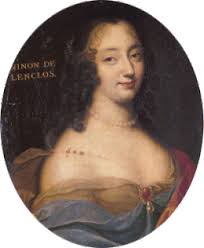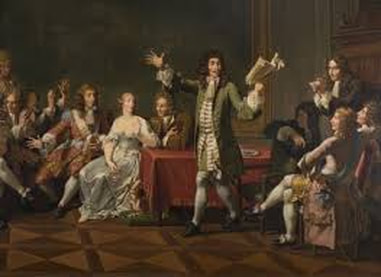|
One of Olympe de Gouges’s role model was Madame d’Eon. Another was Ninon de L’Enclos, philosopher and courtesan of the seventeenth century. L’Enclos was an Epicurean philosopher. In a letter to Saint-Evremont, she wrote: It would be useless to press the arguments, repeated a hundred times by the Epicureans, that the love of pleasure and the abolition of pain are the primary and most natural inclinations noticed in all people. Wealth, power, honor, and virtue contribute to our happiness, but the enjoyment of pleasure, let us call it voluptuousness, to sum up everything in a word, is the true aim and purpose to which all human acts are inclined. (Letter to the modern Leontium) She developed her philosophy in her correspondence with Saint-Evremont and the Marquis de Sevigne. She offered a naturalistic and mechanistic metaphysics, ethics and theory of love. In an unsigned 1659 pamphlet, The Coquette Avenged, she argued that one could be virtuous without the help of the church. This view caused as much scandal if not more as her lovers. Recent biographers, such as Martial Debriffe, Ninon de Lenclos; La belle insoumise. (Paris: France-Empire, 2002) have begun to give Ninon the place she deserves as a philosopher and as a proto-feminist. But as far as the 19thcentury her reputation was divided. Male historians regarded her almost universally as a courtesan first, a libertine, who scandalized France by taking as many lovers as a man in her position would have. So when Olympe claims her as a model, these same historians understand that she wanted to make her fortune as a high class prostitute: With her love of adventure she was soon thrown in a whirlwind of romantic intrigues. She became the soul of all the epicurean clubs, and claimed the honour of being called the Ninon of the 18thcentury. She could have succeeded in achieving the same notoriety, says M. Desessarts in his Proces de la Revolution, if her most fiery and impetuous passions had not caused her to wither early.” There’s a common fallacy here, which comes of judging a woman’s ambitions through a man’s gaze. Olympe did not wish to be like Ninon because men saw her as a beautiful prostitute! Olympe, they say, became a writer because she no longer looked good enough to be a courtesan. But what these historians fail to see, blinded by Ninon’s sexual reputation, is that Ninon was all along a talented author, and that this is clearly what attracted Olympe’s attention. Her 1788 play Moliere chez Ninon, gives us a better idea of what it was Olympe saw in Ninon, aside from the fact that she was a daring author. Mlle LE ROI - She does not dissimulate enough, nor is she hypocritical enough, to hide her way of life from us, she does not make of us her confidants yet she is unconcerned by what we may perceive. The phrase ‘a good man in the guise of a woman’ recalls Olympe’s admiration of Madame d’Eon, the 18thcentury trans-woman who fought and won duels in London. But the qualities of honesty, and straightforwardness, the lack of concern for gossip and the ability to relate to all, regardless of class are almost certainly also what Olympe admired and sought to emulate. Many of her writings enjoin the readers to take her as she is, and warn them that she will not pretend to be otherwise than nature has made her.
0 Comments
Leave a Reply. |
About
This is where I live blog about my new book project, an intellectual biography of three French Revolutionary women philosophers. Categories
All
Archives
November 2022
|


 RSS Feed
RSS Feed